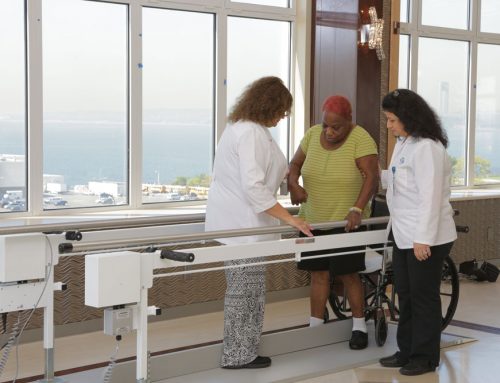An ileostomy is a life-saving operation that requires diverting the small bowel through an abdominal opening. Living with an ileostomy can be traumatic at first until you adjust and learn to cope with professional medical care and help. Many people who have had colostomy and ileostomies can lead normal, active lives.
Haym Salomon Home for Nursing & Rehabilitation in Brooklyn NY helps ileostomy patients recover and cope with their condition. Our friendly, efficient, compassionate, and experienced staff will support and guide you as you make a gradual recovery. They can help to ensure that living with an ileostomy becomes easier day by day.
For some patients, such as those with Crohn’s disease, an ileostomy often leads to a much better quality of life. Let’s take a look at some useful things to know about living with an ileostomy. However, be aware that this is for information only and that you should seek medical advice if affected.

What Is It Like Living With An Ileostomy?
Initiially, and after at least two weeks in hospital after an operation, many patients feel distressed, depressed, and anxious. They may need psychological counseling and certainly as much emotional support and TLC as possible. Other feelings may include anger, frustration, embarrassment, and pain.
Unpleasant signs of an ileostomy may include odor, leakages and wind. Gas (flatulence) can be embarrassing and uncomfortable but can be reduced by avoiding fizzy drinks and chewing your food well. Unpleasant effects of an ileostomy can be managed with practice, perseverance, and following the advice of medical professionals.
A stoma nurse can explain how to use the stoma bag, how to empty it, and any problems. He or she will advise you on how to deal with skin irritation around the abdominal opening. Discussing your predicament with others who are living with an ileostomy can be very helpful.
Does ileostomy reduce life expectancy?
This will very much depend on what caused the ileostomy procedure to be required in the first place. Age, the patient’s overall health, and the ability and willingness to adjust to living with an ileostomy are key factors. In general, it is perfectly possible for ileostomy patients to live long, healthy, and active lives.
Foods to avoid
Living with an ileostomy will involve paying close attention to your diet. To prevent food blockages, you should avoid foods like nuts, sweetcorn, and dried fruit. Celery, mushrooms, coconut, and bamboo shoots are others to be careful about.
Initially you should avoid a high-fiber diet as this will make your stool thicker and could cause a blockage. Try out different foods and monitor what happens to your stool consistency. That way you will learn which foods suit you best. Be sure to drink plenty of water as many ileostomy patients suffer from dehydration.
Feel free to contact us if you need more information about our care services and restorative therapies for people living with an ileostomy and colostomy. We are here to answer any questions you may have. You can also walk in any day to see things for yourself.
This content comprises informative and educational resources only and can not be considered as a substitute for professional health or medical guidance. Reliance on any information provided in this article is solely at your own risk. If you have any inquiries or apprehensions about your medical condition or health goals, talk with a licensed physician or healthcare provider.






Leave A Comment